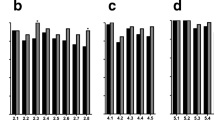Abstract
Recent studies from Western countries indicate significant levels of questionable research practices, but similar data from low and middle-income countries are limited. Our aims were to assess the prevalence of and attitudes regarding research misconduct among researchers in several universities in the Middle East and to identify factors that might account for our findings. We distributed an anonymous questionnaire to a convenience sample of investigators at several universities in Egypt, Lebanon, and Bahrain. Participants were asked to a) self-report their extent of research misconducts, as well as their knowledge of colleagues engaging in similar research misconducts and b) provide their extent of agreement with certain attitudes about research misconduct. We used descriptive, bivariate, and multivariate logistic regression statistics to analyze the data. Data from 278 participants showed a high prevalence of misconduct, as 59.4% of our respondents self-reported to committing at least one misbehaviors and 74.5% reported having knowledge of any misbehaviors among any of their colleagues. The most common type of self-report misconduct was “circumventing research ethics regulations” (50.5%) followed by “fabrication and falsification” (28.6%). A significant predictor of misconduct included a lack of “prior ethics training”. Scientific misconduct represents a significant issue in several universities in the Middle East. The demonstration that a lack of “prior ethics training” was a significant predictor of misconduct should lead to educational initiatives in research integrity. Further studies are needed to confirm whether our results can be generalized to other universities in the Middle East.
Similar content being viewed by others
References
Adeleye, O. A., & Adebamowo, C. A. (2012). Factors associated with research wrongdoing in Nigeria. Journal of Empirical Research on Human Research Ethics, 7(5), 15–24. https://doi.org/10.1525/jer.2012.7.5.15.
Bamford, J., & Sergiou, K. (2005). International students and plagiarism: an analysis of the reasons for plagiarism among nternational foundation students. Investigations in University Teaching and Learning, 2(2), 17–22.
Bohannon, J. (2014). Study of massive preprint archive hints at the geography of plagiarism. Science. Retrievalbe at: http://news.sciencemag.org/scientific-community/2014/2012/study-massive-preprint-archivehints-geography-plagiarism.
Broome, M. E., Pryor, E., Habermann, B., Pulley, L., & Kincaid, H. (2005). The scientific misconduct questionnaire--revised (SMQ-R): validation and psychometric testing. Accountability in Research, 12(4), 263–280. https://doi.org/10.1080/08989620500440253.
Brown, S., & Kalichman, M. (1998). Effects of training in the responsible conduct of research: a survey of graduate students in experimental sciences. Science and Engineering Ethics, 4, 487–498.
Bruhn, J. G. (2009). The functionality of gray area ethics in organizations. Journal of Business Ethics, 89, 205.
Bursac, Z., Gauss, C. H., Williams, D. K., & Hosmer, D. W. (2008). Purposeful selection of variables in logistic regression. Source Code for Biology and Medicine, 3, 17. https://doi.org/10.1186/1751-0473-3-17.
Buzzelli, D. E. (1993). The definition of misconduct in science: a view from NSF. Science, 259(5095), 584–585 647-588.
Citron, D. T., & Ginsparg, P. (2015). Patterns of text reuse in scientific corpus. Proceedings of the National Academy of the Sceinces, 112(1), 25–30.
Davis, M. S. (2003). The role of culture in research misconduct. Accountability in Research, 10(3), 189–201. https://doi.org/10.1080/714906092.
Dhingra, D., & Mishra, D. (2014). Publication misconduct among medical professionals in India. Indian Journal of Medical Ethics, 11(2), 104–107.
Eastwood, S., Derish, P., Leash, E., et al. (1996). Ethical issues in biomedical research: perceptions and practices of postdoctoral research fellow responding to a survey. Science Eng Ethics, 2, 89–114.
Fanelli, D. (2009). How many scientists fabricate and falsify research? A systematic review and meta-analysis of survey data. PLoSOne, 4, 1–11.
Geggie, D. (2001). A survey of newly appointed consultants' attitudes towards research fraud. Journal of Medical Ethics, 27(5), 344–346.
Heitman, E., & Litewka, S. (2011). International perspectives on plagiarism and considerations for teaching international trainees. Urologic Oncology, 29(1), 104–108. https://doi.org/10.1016/j.urolonc.2010.09.014.
Kalichman, M. W., & Freidman, P. J. (1992). A pilot study of bomedical trainees' perceptions concerning research ethics. Academic Medicine, 67, 769–775.
Martinson, B. C., Anderson, M. S., & de Vries, R. (2005). Scientists behaving badly. Nature, 435, 737–748.
Martinson, B. C., Anderson, M. S., Crain, A. L., & de Vries, R. (2006). Scientists' perceptions of organizational justice and self-reported misbehaviors. Journal of Empirical Research on Human Research Ethics, 1(1), 51–66. https://doi.org/10.1525/jer.2006.1.1.51.
Merton, R. K. (1938). Social structure and anomie. American Sociological Review, 3, 672–682.
Mundt, L. A. (2008). Perceptions of scientific misconduct among graduate allied health students relative to ethics education and gender. Journal of Allied Health, 37(4), 221–224.
Nussenzveig, P. A., & Zukanovich Funchal, R. (2008). Integrity: misconduct by a few damages credibility for many. Nature, 454(7204), 574; author reply 575. https://doi.org/10.1038/454574c.
Okonta, P., & Rossouw, T. (2013). Prevalence of scientific misconduct among a group of researchers in Nigeria. Developing World Bioethics, 13(3), 149–157. https://doi.org/10.1111/j.1471-8847.2012.00339.x.
Okonta, P. I., & Rossouw, T. (2014). Misconduct in research: a descriptive survey of attitudes, perceptions and associated factors in a developing country. BMC Medical Ethics, 15, 15.
Pryor, E. R., Habermann, B., & Broome, M. E. (2007). Scientific misconduct from the perspective of research coordinators: a national survey. Journal of Medical Ethics, 33(6), 365–369.
Silverman, H. J. (2000). Organizational ethics in health care organizations: proactively managing the ethical climate to ensure organizational integrity. HEC Forum, 12, 202–215.
The Office of Research Integrity (2016). Definition of Research Misconduct. Retrievable at: https://ori.hhs.gov/definition-misconduct.
Trikalinos, N. A., Evangelou, E., & Ioannidis, J. P. (2008). Falsified papers in high-impact journals were slow to retract and indistinguishable from nonfraudulent papers. Journal of Clinical Epidemiology, 61(5), 464–470.
Funding
Supported by Award Number R25TW007090–10 of the Fogarty International Center at the National Institutes of Health.
Author information
Authors and Affiliations
Corresponding author
Rights and permissions
About this article
Cite this article
Felaefel, M., Salem, M., Jaafar, R. et al. A Cross-Sectional Survey Study to Assess Prevalence and Attitudes Regarding Research Misconduct among Investigators in the Middle East. J Acad Ethics 16, 71–87 (2018). https://doi.org/10.1007/s10805-017-9295-9
Published:
Issue Date:
DOI: https://doi.org/10.1007/s10805-017-9295-9




